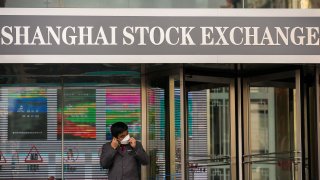
- Morgan Stanley's chief Asia and emerging market equity strategist Jonathan Garner said: "Now what we are seeing, I think, is that the anti-trust regulation is proving sort of much deeper and more long lasting than we had thought."
- Fears over regulatory scrutiny on Chinese tech companies are growing again, after China cracked down on ride-hailing app Didi in early July.
- In a note last week, Morgan Stanley said it preferred Chinese A-shares over those listed in Hong Kong
Morgan Stanley is urging investors to be cautious on Chinese stocks, given the country's recent regulatory crackdown on its internet companies.
The investment bank reiterated its call to downgrade Chinese stocks under the MSCI China index to equal weight, which means they are expected to perform equal to other stocks in other emerging markets. That call was first made in January this year.
Get DFW local news, weather forecasts and entertainment stories to your inbox. Sign up for NBC DFW newsletters.
The MSCI China stocks include both A-shares listed on the mainland, and offshore shares listed in Hong Kong.
Jonathan Garner, chief Asia and emerging market equity strategist at Morgan Stanley explained why the bank has repeated that call. "What we are seeing, I think, is that the anti-trust regulation is proving sort of much deeper and more long lasting than we had thought," he told CNBC's "Squawk Box Asia" on Tuesday.
Regulatory fears
Money Report
Fears over regulatory scrutiny on Chinese tech companies are growing again, after China announced a cybersecurity review of ride-hailing app Didi in early July.
Authorities ordered app stores to remove Didi's app for download, just days after the Chinese company launched its IPO in the U.S. Chinese regulators also alleged that Didi had illegally collected users' personal data.
Since then, China has opened a cybersecurity review into three more Chinese companies listed in the U.S.
Garner also pointed to China's "new focus" on data security.
Beijing recently started a new battlefront in tackling the use and collection of data. A data security law passed in June defined the rules around how all companies collect, store, process and transfer data. The law will take effect in September.
Authorities said last week that China plans to strengthen supervision of all Chinese firms listed offshore, as well as tighten rules around how data security is managed by firms. On Saturday, China's cyberspace regulator proposed that any company with data on more than 1 million users must go through a cybersecurity review before listing overseas.
"So there's a high degree of uncertainty as to how this affects the investment landscape and the growth of internet space in China," Garner said.
What it means for A-shares
In a note last week, Morgan Stanley said it preferred Chinese A-shares listed in the mainland over those listed in Hong Kong, in light of that announcement last week for more regulatory oversight of Chinese companies listed overseas.
The regulatory announcement also said Beijing will be tightening restrictions on "illegal activities" in securities market, including insider trading and financial fraud. That would be good for A-shares as it signals that China wants to boost the quality of its domestic markets, Morgan Stanley pointed out.
"Not all companies are likely to be affected equally. We think Chinese companies in certain sensitive sectors, e.g., data-rich tech firms and those operating in areas where foreign ownership is restricted, will likely seek more onshore and/or HK listings instead of in the US," the investment bank said.
Uncertainty looms
However, Morgan Stanley said the "deeper background driving force" pushing companies to flock home to list will ultimately depend on how the relationship between U.S. and China progresses.
The bank warned that more uncertainty lies ahead.
"Investors have seen multiple rounds of industry regulatory tightening ... since late last year. We think it would be more negative if the scope of regulatory tightening continued to widen and eventually evolved into a broader concern over Chinese equities in general," its analysts wrote.
"Under such a scenario, the equity risk premium could rise across the board for Chinese equities and the investability of Chinese equities could diminish," it added.
Beijing has been cracking down on domestic technology giants for much of the past year, from the cancellation of Ant Group's $34.5 billon listing to Alibaba's $2.8 billion antitrust fine. The focus has very much been on anti-monopoly practices as well as financial technology regulation.
— CNBC's Arjun Kharpal contributed to this report.






